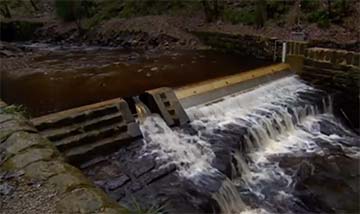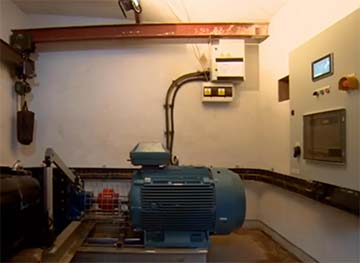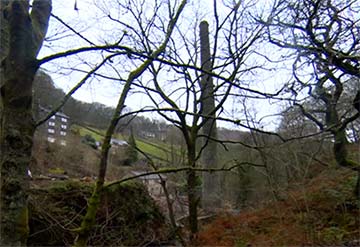Hydro-power scheme in Hebden Bridge
Updated: Sunday, 20 December 2015
A Hydro-power scheme which prompted extensive discussion on the HebWeb Forum last year is now up and running.

A new hydro electricity scheme has started generating clean, low-carbon energy, just days before the government alters its feed-in tariff scheme. The changes to the scheme will make many low-carbon energy schemes too expensive to operate, and the new hydro scheme may be one of the last of its kind to complete in time to take advantage of the feed-in tariff.
The scheme, in the Colden Valley is constructed on the ruins of Lower Lumb Mill, a 200-year-old cotton mill, and uses the original weir and water channels that supplied the industrial-revolution-era mill when it was first built in 1802: it will produce enough clean electricity to power around 40 homes and save 60 tonnes of CO2 per year from polluting the atmosphere

The £450,000 project is the brainchild of Bede and Jane Mullen, who have lived by the ruins of Lower Lumb mill for over 30 years. Over 60% of the project's budget has been spent locally on contractors and suppliers and directly employed 5 full time local construction workers for the duration of the build.
"Ever since we first moved to the valley, we've dreamed of harnessing the incredible energy that the river produces all year round", Bede told the HebWeb. "When I retired recently, Jane and I decided to turn our dream into reality, and we've spent the last three and a half years planning and constructing the new hydro electric scheme. But it's incredibly sad to think that ours will be the last of its kind to be built, because of the withdrawal of government support for clean energy schemes like ours."
The scheme uses state-of-the-art technology, including a specially-commissioned turbine which is sited in a small building that has been designed to fit in with its surroundings. At its peak, it will deliver 40 kilowatts of electricity, connected directly to the National Grid. At the heart of the scheme is the original weir and goyt that directed water to the watermill that provided power for the cotton mill that occupied the site from 1802 until its demolition in the 1930s.
With so many streams and rivers falling from our hills, it is unfortunate that similar schemes won't benefit. The Industrial Revolution started in our hills because there was water to power the mills.

Completed within just days of the subsidy cut
The project – which took two years to plan and a further year and a half to construct – has completed just days before the change in the feed-in tariff, which is a crucial part of the project's income.
Bede and Jane funded the scheme by remortgaging their house, so the change in the subsidy has been a big concern for them.
"The feed-in tariff changes at the end of 2015," explained Jane Mullen. "With the current tariff, we'll recoup our investment in around 14 years – but without it, it would take over 100 years. So it's been extremely stressful to complete this close to the wire."
The change in the feed-in tariff is a significant reversal of government policy, and will discourage investment in clean energy projects, argue Jane and Bede. "Dirty fuels, such as coal, are only cheap because they don't have to factor in the cost of the damage that climate change will cause as a result of their use.
The International Monetary Fund estimate that fossil fuel energy production in the UK receives £400 per head subsidy per year whereas renewables receive one eighth of that amount," says Bede. "Renewables need a subsidy to be able to compete, and without a clear, reliable, long-term commitment to encourage their development by the government, investors will have no choice but to abandon projects like the one that we've just completed."
The construction team has been working long days in all weather conditions to meet the deadline. But now that the scheme is complete Bede and Jane are justifiably proud that they've got a reliable source of clean, low-carbon electricity in their valley.
Report from Look North
See also
HebWeb Forum: Water power in the valley (Nov-Dec 2014) - 37 messages.

